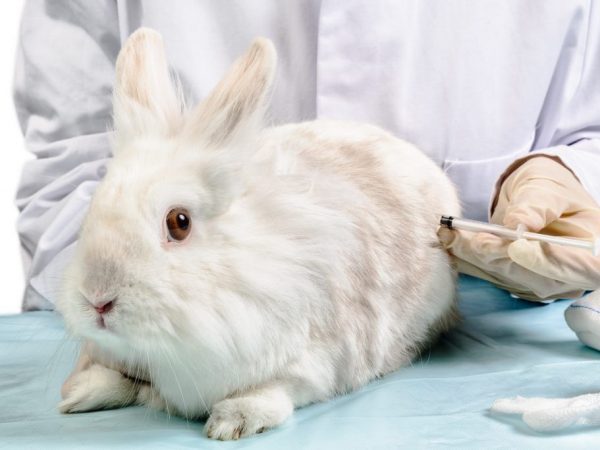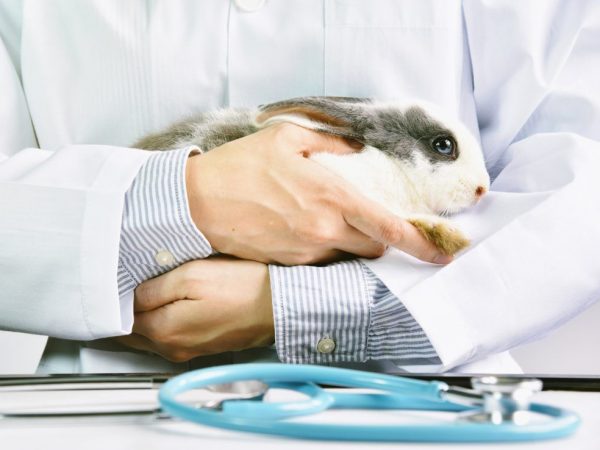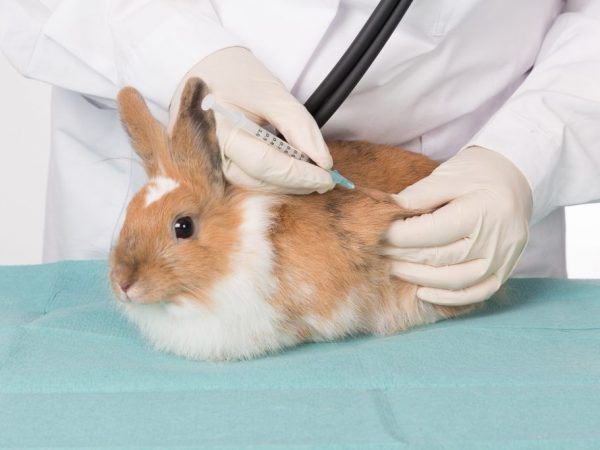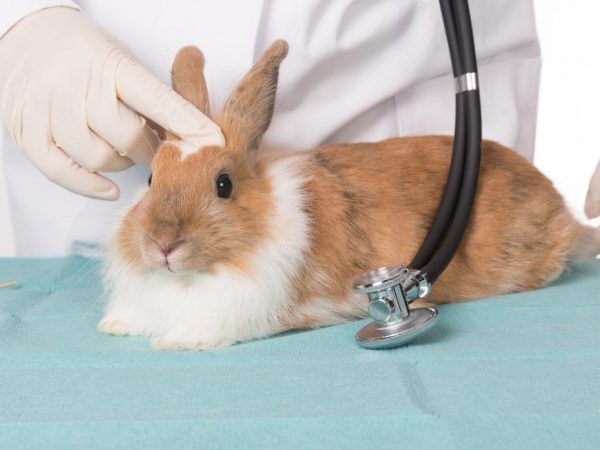Vaccination of rabbits
Rabbits have always been popular as a household item. They can be kept both in an apartment as pets and for further resale and slaughter, that is, in the meat and fur industry. This popularity is due to the fact that pussies are undemanding animals that take root in almost all conditions.

Prevention of rabbit diseases
The only thing that can hinder a successful business is the disease of animals. In order to keep the livestock, it is recommended to vaccinate rabbits on time. Today we will figure out what vaccination of rabbits is, whether it is necessary to vaccinate rabbits, what vaccinations are given to rabbits and at what age, from what diseases they can protect.
What is rabbit vaccination for?
Those who have been breeding rabbits for years already know firsthand what a massive drop in the number of rabbits is. The fact is that rabbit diseases spread at a high speed, all animals can become infected in just a few days, as a result, it is not possible to save the livestock. Many novice breeders are discouraged by this fact, for this reason they refuse to breed rabbits. Indeed, it is quite a shame to suffer financial losses at the very beginning of the enterprise if a massive outbreak of the disease occurs.
The opinion that eared ears are one of the most painful animals is incorrect: they get sick no more often than the same cows or goats.
However, there are factors and reasons why the risk of sickness in rabbits is higher than in other animals. Among the most common factors in the onset of the disease are the following:
- If the crawl menu contains hay and fresh herbs, the risk of contracting a virus or catching a parasite increases significantly.
- Regular contact with other pets such as dogs and cats.
- Animals are outdoors in the grass, not in cages.
- When rabbits live near water or wetlands.
- In summer, when blood-sucking insects are especially active.

Why are vaccinated?
So should rabbits be vaccinated? Some breeders believe that the need for this action is grossly exaggerated. It is much easier to isolate a sick animal from healthy ones, treat it and return it to a common cage. If we are talking about 2-5 animals, it is advisable to do so. However, in cases where the farm contains more than a dozen, it is economically unprofitable. It is much easier to carry out all the vaccinations for rabbits in accordance with the plan than to see at one "perfect" moment that most of the rabbits are infected and are on the verge of life and death.
Most illnesses come on suddenly, symptoms appear immediately, and the ailment acts aggressively.
What vaccinations do rabbits need? Those that help the body of pets to fight with especially dangerous diseases. These include:
- myxomatosis;
- coccidiosis;
- rabbit hemorrhagic disease;
- pastrellosis;
- rabies.
All of these diseases have no cure at all, the only thing that can protect the rabbit is vaccination. These are vaccines known as mandatory rabbit vaccinations. We will find out what vaccines are and when to do the first, in order to provide the animal with proper protection.
Features of rabbit vaccination
At what age are rabbits vaccinated? Usually, the first vaccination of farm rabbits, like everyone else, occurs from 2-3 months of age. This is due to the fact that it is at this age that young rabbits are separated from their mother, they switch to independent nutrition. Vaccinations for dwarf rabbits need to be done especially carefully. All this is a great stress for the body, respectively, the immunity of the animal, which was previously supported by milk, also falls. Thus, it is this age that is ideal for starting vaccination.
If there is an unvaccinated animal on the farm, all necessary vaccines should be supplied immediately, after which the usual classical revaccination scheme should be followed, which is strictly mandatory.
Vaccination can be carried out both independently and with the help of a veterinarian. At first, it is recommended to use the services of a professional: he will tell you which vaccine for rabbits is the best and highest quality, what are the features of its implementation.

Basic rules for vaccination of rabbits
How to vaccinate rabbits yourself? If a decision is made to vaccinate fluffies on your own at home, you need to choose a rabbit vaccination schedule (or a rabbit vaccination schedule), which you will have to adhere to in the future. You will also need a special syringe, which is sold at a pharmacy called an injector, and the vaccine itself. Of course, you can use ordinary syringes, but it is the injector that is able to inject the vaccine to the desired depth, which will allow the correct vaccination for rabbits.
If the vaccine is sold in the form of a dry powder, which is diluted with liquid in the right proportions, then it must be distilled water. It is impossible to store the already prepared solution.
Before starting the introduction of the drug, you need to make sure that the rabbit is immobilized. Where is the drug being injected? The injection must be made intramuscularly, usually the area at the top of the hind paw is selected for this. In general, vaccination of rabbits at home is similar to a hospital procedure.
What vaccines do rabbits need?
What vaccinations should rabbits receive in Russia? The most important is to vaccinate rabbits against hemorrhagic disease, or HBV. In case of illness, that is, in the absence of vaccination, the animal dies. You need to start vaccinating as a standard in 2-3 months, but if there is an outbreak of this disease on the farm, then the vaccination should be done even for monthly rabbits. The booster is given every 2 months to maintain immunity to the disease.
The second most important is the vaccination against myxomatosis; in the Russian Federation, the pokrovka vaccination is used. Usually, the spread of the disease is accompanied by blood-sucking insects, so it is recommended to start vaccinating rabbits in the summer until mid-autumn, but not in winter.
According to the schedule, the pokrovka vaccination against myxomatosis should always follow the VGBK, it is advisable to pause for a period of 2-3 weeks.
Can pregnant rabbits be vaccinated? As it turned out, pregnant rabbits can be vaccinated, but only if an epidemic spreads. The answer to the question of whether it is possible to vaccinate lactating rabbits is similar. Sick animals must be vaccinated in a general manner.
Immunity is active for a period of 5-6 months, after which it is necessary to repeat the vaccination in the middle of spring.
What is a comprehensive vaccine
Earlier we talked about individual vaccines, which help protect for a certain period of time from only one specific disease.However, now more and more often you can find stories of farmers about complex vaccines. What it is?
Comprehensive vaccination for rabbits is a drug that contains antibodies to many diseases. Currently, the most commonly used:
- Nobivak (can even be used as a rabbit vaccine against rabies);
- Pestorin;
- Lapimun.
When should rabbits be vaccinated? The vaccination schedule for rabbits with the introduction of complex vaccines differs from that described earlier. The first vaccination of rabbits occurs at 1.5 months, the second at 3 months; then every 6 months the procedure must be repeated. It is best to start a comprehensive vaccination in the spring.

What is a comprehensive vaccination
Complex vaccination works against diseases such as HBV, myxomatosis, paratyphoid fever, pastrellez, rabies, etc.
The issue of vaccinations is especially acute when cases of infection with this or that disease have been recorded in the territories adjacent to the farm.
You can choose both a complex and a monovaccine, it all depends on personal preferences, as well as on financial capacity, because the cost of a complex vaccine in Russia is more expensive. How much does a vaccine cost in Russia? The price of one vaccine against rabbit diseases starts from 100 rubles per ampoule.
Pros of a comprehensive vaccine
Earlier, we talked about the fact that a complex vaccine involves the introduction of antibodies against several diseases at once. This is the same virus, only in a lightweight form, which can be overcome by a healthy rabbit organism. It is important to get a vaccine that is of no doubt quality. Consultation with a veterinarian or advice from other farmers can help.
It is believed that it is more difficult for an animal to survive the introduction of a complex vaccine for rabbits, since the immunity has to fight several diseases at once, but this is not the case. A healthy body can handle this.
It is believed that it is the complex vaccine that acts more gently, because the eared has only one injection, so the period after vaccination in rabbits at home is easier. This is also explained by the fact that complex vaccines have been developed relatively recently, they belong to the second and third generation drugs.
Combination vaccines can now be found:
- From myxomatosis and viral hemorrhagic disease (Czech production).
- From salmonellosis and pastrellosis.
- Against pastrellosis and streptococcal infection.
Such a vaccine reduces the risk of developing side effects, which cannot be said about monovaccines.
Features of successful vaccination
How to vaccinate rabbits correctly? It doesn't matter what vaccinations you decide to inject for domestic rabbits: for a successful vaccination, you need to adhere to the following recommendations and rules:
- The animal must be 100% healthy. If even the slightest deviation from the norm has become noticeable, you need to abandon the injection and postpone the vaccination for a while. Before introducing the drug, it is recommended to simply observe the pet's behavior for a while to make sure its health. The right decision would be to entrust the examination to a veterinarian who will provide the animal with a comprehensive examination before injection.
- If you decide to vaccinate a rabbit yourself at home, you need to carefully read the instructions for the drug. This is necessary even if the drug is not used for the first time. The fact is that some points of the instructions may change, which you need to be aware of. Also, do not forget to look at the expiration date: an expired vaccine must be disposed of.
- The dosage of the medicine should be calculated strictly on the basis of the instructions; it is strictly forbidden to change the dose on your own: in this way, antibodies will not be formed, and the animal will remain defenseless against diseases.
- It is strictly forbidden to deviate from the vaccination schedule.The fact is that the effect of all injections is designed for a certain period, which cannot be changed.
- In addition to the fact that the rabbit must be healthy at the time of the vaccine administration, it is worth carrying out preventive treatment of helminths. This is usually done a few days before the planned date of vaccination. How to properly examine the subject of the disease can be seen in numerous photos and videos.
- The minimum weight of a rabbit at the time of inoculation must be at least 500 g. If the weight does not correspond, the vaccine cannot be given.
- It is considered highly undesirable to vaccinate pregnant rabbits, as well as those that are lactating. The only exceptions are epidemic outbreaks of diseases.
- The minimum pause between the administration of the vaccine (mono) is 2-3 weeks.
- You should not buy vaccines for rabbits from your hands and on the Internet. You need to be sure that the medicine was stored and transported correctly, only a veterinary pharmacy can guarantee this.
- After the vaccination in the veterinary clinic, you need to make sure that the corresponding mark about the procedure performed appears in the animal's veterinary passport.
The general rule that must be followed to reduce the likelihood of side effects is refusal to bathe in the next 2-3 days after the injection. It is also advisable not to overcool the pet and protect it from stress, since all this negatively affects the rabbit's immunity.
Ultimately, the answer to the question of whether rabbits should be vaccinated is yes. Now you know how to vaccinate a rabbit, what drugs need to be administered to save it from contracting deadly diseases, when it is correct to vaccinate rabbits. It remains only to follow the scheme.


